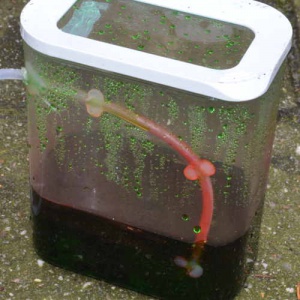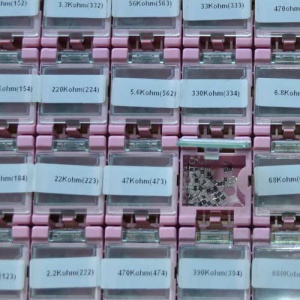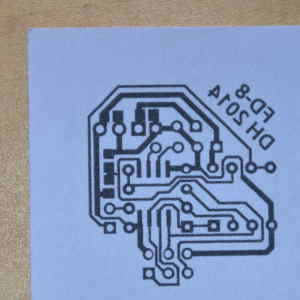Difference between revisions of "Main Page"
From Just in Time
(adding pictures) |
m (→Featured) |
||
| (20 intermediate revisions by the same user not shown) | |||
| Line 1: | Line 1: | ||
| − | + | =Just In Time Project Pages= | |
| − | + | These pages contain descriptions of our electronics projects, mainly involving [http://www.atmel.com/products/avr/ AVR] microcontrollers. | |
| − | + | __TOC__ | |
| − | |||
==Featured== | ==Featured== | ||
{| class="wikitable" border="1" | {| class="wikitable" border="1" | ||
|- | |- | ||
| − | | [[File: | + | |style="width:64px;"|[[File:Ws2811 thumbnail.jpg|upright=1.0|link=Driving the WS2811 at 800 kHz with an 8 MHz AVR]] |
| − | |||
| − | |||
| − | |||
| − | |||
| '''WS2811 LED strips & 8Mhz AVR''' | | '''WS2811 LED strips & 8Mhz AVR''' | ||
Want to know how to drive a WS2811 led string from an 8 Mhz AVR? [[Driving the WS2811 at 800 kHz with an 8 MHz AVR|This page]] has the code and explains it. Works for Arduino too... | Want to know how to drive a WS2811 led string from an 8 Mhz AVR? [[Driving the WS2811 at 800 kHz with an 8 MHz AVR|This page]] has the code and explains it. Works for Arduino too... | ||
| + | |- | ||
| + | |[[File:Hamsterwheel thumbnail.png|64px|link=Internet of Hamsters]] | ||
| + | |'''Internet of Hamsters''' | ||
| + | It's [[Internet of Hamsters|hamsters]]. It's internet. What more could you possible want? | ||
| + | |- | ||
| + | |[[File:Telescope thumbnail.png|64px|link=WiFi telescope and camera control]] | ||
| + | |'''Telescope and camera control''' | ||
| + | [[WiFi telescope and camera control|WiFi-to-serial bridge]] allowing existing apps to talk to a telescope, but also control an attached camera | ||
|- | |- | ||
| [[File:Transceiver433 cropped.jpg|64px|link=Cheapest ever 433 Mhz transceiver for PCs]] | | [[File:Transceiver433 cropped.jpg|64px|link=Cheapest ever 433 Mhz transceiver for PCs]] | ||
| '''USB 433Mhz transceiver for $3''' | | '''USB 433Mhz transceiver for $3''' | ||
Cheap 433Mhz receivers and transmitters are ideal to communicate with your microcontroller, but can also be used to control inexpensive RF-controlled switches. If you've got $3, an ebay account and a soldering iron, you can now [[Cheapest ever 433 Mhz transceiver for PCs|control your light switches through a USB port]]. | Cheap 433Mhz receivers and transmitters are ideal to communicate with your microcontroller, but can also be used to control inexpensive RF-controlled switches. If you've got $3, an ebay account and a soldering iron, you can now [[Cheapest ever 433 Mhz transceiver for PCs|control your light switches through a USB port]]. | ||
| + | |- | ||
| + | | [[File:FD8 thumb.jpg|64px|link=Digital FD-8 pedal]] | ||
| + | | '''Digital FD-8 repair''' | ||
| + | Roland FD-8 hi-hat pedals have a tendency to become unresponsive over time. Instead of trying to repair the internal film resistor, why not completely [[Digital FD-8 pedal|replace its guts with a small microcontroller]] for accurate control without wear and tear? If you think a microcontroller is overkill, we also have [[Roland FD-8 Issues: Hall Sensor Modification|an analog electronics version]]. | ||
| + | |- | ||
| + | | [[File:Straddling header thumbnail.jpg|64px|link=Evolution of breadboard programming headers]] | ||
| + | | '''Breadboard AVR Programming Headers''' | ||
| + | To celebrate the release of Vinnies [[Vinnies Definite Straddling Header|student-proof, straddling programming header]], we've finally gotten around to documenting the [[Evolution of breadboard programming headers|programming headers]] we use for AVR breadboard programming! | ||
|} | |} | ||
==Projects== | ==Projects== | ||
Here are some finished, or work in progress activities: | Here are some finished, or work in progress activities: | ||
| − | {| class="wikitable" border="1" | + | {| class="wikitable sortable mw-collapsible" border="1" |
|- | |- | ||
! Project | ! Project | ||
! Page status | ! Page status | ||
! Project status | ! Project status | ||
| + | |- | ||
| + | | [[Identifying Christmas Lights]] (ongoing project log) | ||
| + | |started | ||
| + | |ongoing | ||
| + | |- | ||
| + | | [[Fast, arduino compatible digital pin functions]], digitalWrite() in 2 clock ticks | ||
| + | | started | ||
| + | | finished | ||
|- | |- | ||
| [[Sending location information from an Android phone to a Nikon camera]] | | [[Sending location information from an Android phone to a Nikon camera]] | ||
| started | | started | ||
| − | | | + | | halted |
|- | |- | ||
| [[WS2811 "Water torture"]] | | [[WS2811 "Water torture"]] | ||
| Line 85: | Line 104: | ||
|[[Oven temperature controller]] | |[[Oven temperature controller]] | ||
| in progress | | in progress | ||
| − | | | + | | halted |
|- | |- | ||
|[[RGB Light Show (Wired/Wireless)]] | |[[RGB Light Show (Wired/Wireless)]] | ||
| Line 110: | Line 129: | ||
==Our set up== | ==Our set up== | ||
| − | Nowadays, we prefer to do our stuff in SMT because it avoids the bore of drilling holes. And you can make use of cheap SMT resistor and capacitor assortments so you'll always have the right values available. Working in SMT requires making PCBs. We use the toner transfer method. One tip: the ironing sticks much better if the paper is wet. And one other tip: etching in [http:// | + | Nowadays, we prefer to do our stuff in SMT because it avoids the bore of drilling holes (yes, pun intended). And you can make use of cheap SMT resistor and capacitor assortments so you'll always have the right values available. Working in SMT requires making PCBs. We use the toner transfer method. One tip: the ironing sticks much better if the paper is wet. And one other tip: etching in [http://www.instructables.com/id/Stop-using-Ferric-Chloride-etchant!--A-better-etc/ cupric chloride] works very well and you never run out of etchant! |
{| | {| | ||
| Line 121: | Line 140: | ||
==ToDo List== | ==ToDo List== | ||
Here are some projects on our to do list: | Here are some projects on our to do list: | ||
| − | * CC2500 Wireless System, on hold while we're working on the | + | * <s>CC2500 Wireless System</s>, on hold while we're working on the |
| − | * Nordic | + | * Nordic NRF24L01+ wireless system (first library now part of [https://github.com/DannyHavenith/avr_utilities avr_utilities]) |
| + | * Update our [[RGB Light Show (Wired/Wireless)|RGB spotlights]] to use Bit Angle Modulation | ||
* AVR DAC Audio playback | * AVR DAC Audio playback | ||
* Midi Chord generator | * Midi Chord generator | ||
Latest revision as of 21:17, 19 November 2020
Just In Time Project Pages
These pages contain descriptions of our electronics projects, mainly involving AVR microcontrollers.
Featured

|
WS2811 LED strips & 8Mhz AVR
Want to know how to drive a WS2811 led string from an 8 Mhz AVR? This page has the code and explains it. Works for Arduino too... |

|
Internet of Hamsters
It's hamsters. It's internet. What more could you possible want? |

|
Telescope and camera control
WiFi-to-serial bridge allowing existing apps to talk to a telescope, but also control an attached camera |

|
USB 433Mhz transceiver for $3
Cheap 433Mhz receivers and transmitters are ideal to communicate with your microcontroller, but can also be used to control inexpensive RF-controlled switches. If you've got $3, an ebay account and a soldering iron, you can now control your light switches through a USB port. |

|
Digital FD-8 repair
Roland FD-8 hi-hat pedals have a tendency to become unresponsive over time. Instead of trying to repair the internal film resistor, why not completely replace its guts with a small microcontroller for accurate control without wear and tear? If you think a microcontroller is overkill, we also have an analog electronics version. |

|
Breadboard AVR Programming Headers
To celebrate the release of Vinnies student-proof, straddling programming header, we've finally gotten around to documenting the programming headers we use for AVR breadboard programming! |
Projects
Here are some finished, or work in progress activities:
Some older software projects:
- An eclipse plugin for SX assembly language.
- Sxgo, a fast, portable SX28 emulator.
Programming AVRs
You might want to know how to run avrdude from eclipse under linux.
Atmel has released a 4K version of the well-known Attiny2313, called the Attiny4313. It is fully (pin) compatible, with the only difference that it has double memory. The Attiny4313 is not yet recognized by Avrdude, so we have modified the Avrdude config file to be able to program it. This link contains the Attiny4313 section that should be added to your config.
Our set up
Nowadays, we prefer to do our stuff in SMT because it avoids the bore of drilling holes (yes, pun intended). And you can make use of cheap SMT resistor and capacitor assortments so you'll always have the right values available. Working in SMT requires making PCBs. We use the toner transfer method. One tip: the ironing sticks much better if the paper is wet. And one other tip: etching in cupric chloride works very well and you never run out of etchant!
ToDo List
Here are some projects on our to do list:
CC2500 Wireless System, on hold while we're working on the- Nordic NRF24L01+ wireless system (first library now part of avr_utilities)
- Update our RGB spotlights to use Bit Angle Modulation
- AVR DAC Audio playback
- Midi Chord generator
- Solarpower Chicken Lighting System
- PIC-based MidiFilePlayer
- Drumcomputer
- DCC Train control system
- simple GPS logger based on rs232 receiver
- sunrise alarm clock
Items that were on this list, but are finished now (without write-up)
- 100Mhz SX based Frequency Counter (done)
- AVR Bootloader System (done)


